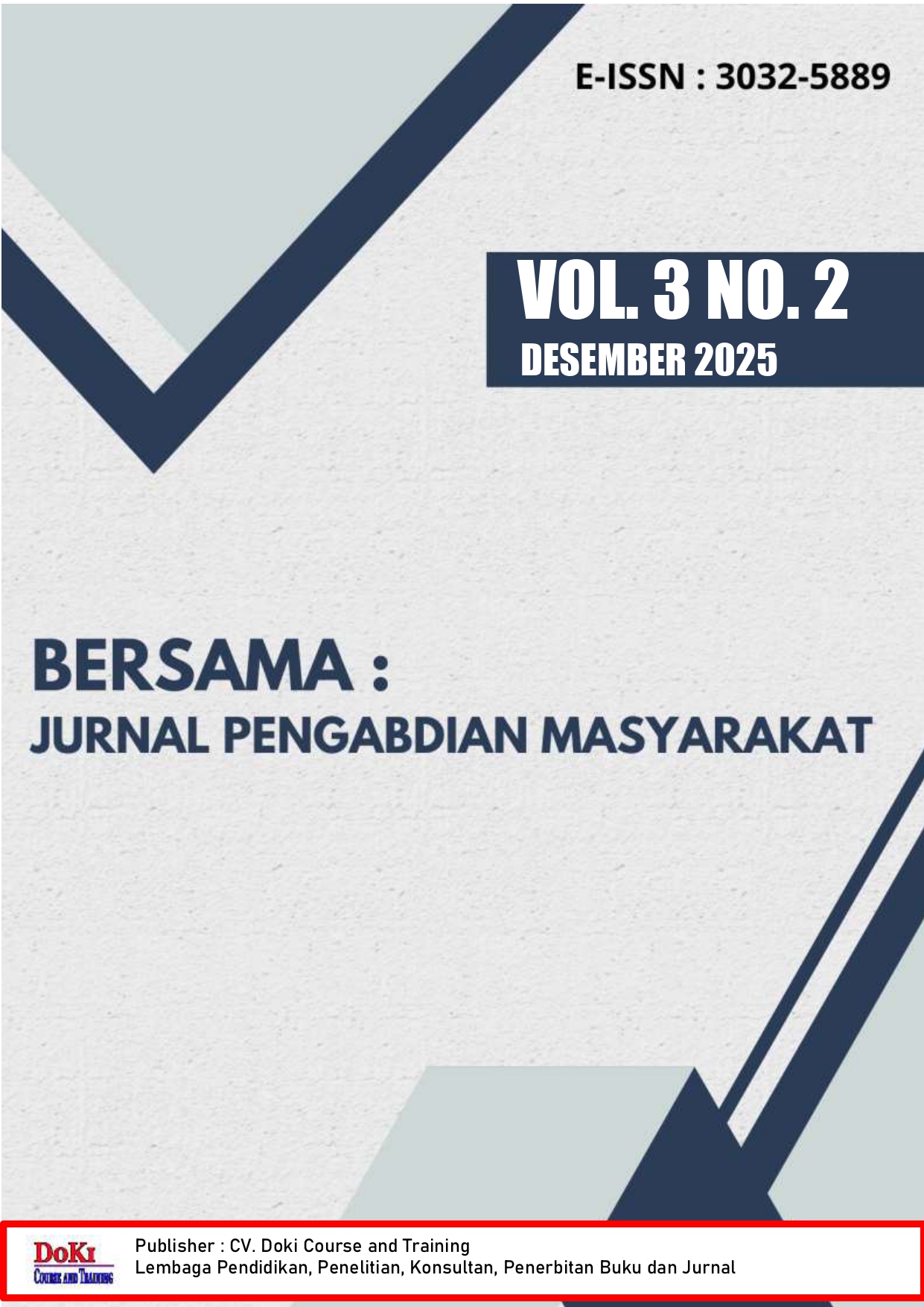Kolaborasi Teknologi Informasi, Keuangan dan Psikologi Kerja menuju Green Leadership
DOI:
https://doi.org/10.61994/bersama.v3i2.1299Keywords:
Teknologi Informasi, Manajemen Keuangan, Psikologi KerjaAbstract
Isu keberlanjutan lingkungan menuntut keterlibatan aktif generasi muda, khususnya mahasiswa, dalam membangun kepemimpinan hijau (green leadership). Program pengabdian kepada masyarakat ini bertujuan memperkuat green leadership mahasiswa melalui integrasi tiga aspek utama: teknologi informasi, manajemen keuangan, dan psikologi kerja. Metode pelaksanaan meliputi analisis situasi, perencanaan program, pelatihan, pendampingan, serta evaluasi menggunakan tes awal–akhir dan observasi partisipatif. Hasil kegiatan menunjukkan adanya peningkatan signifikan dalam pemahaman mahasiswa tentang isu lingkungan, keterampilan mengelola anggaran hijau, serta kemampuan menggunakan media digital untuk kampanye keberlanjutan. Selain itu, aspek psikologi kerja seperti motivasi, efikasi diri, dan komitmen mahasiswa terhadap aksi lingkungan juga mengalami penguatan. Temuan ini sejalan dengan literatur terkini yang menegaskan pentingnya pendekatan multidisipliner dalam pendidikan keberlanjutan. Dengan demikian, program ini tidak hanya memberikan dampak praktis bagi mahasiswa, tetapi juga menawarkan model integratif bagi perguruan tinggi dalam mencetak pemimpin muda yang kompeten, berdaya saing, dan berorientasi pada keberlanjutan.
References
[1] Hannes Zacher, Clara Kühner, Ian M. Katz, and Cort W. Rudolph, “Leadership and Environmental Sustainability: An Integrative Conceptual Model of Multilevel Antecedents and Consequences of Leader Green Behavior,” Group & Organization Management (GOM), vol. 49, no. 2, Feb. 2024.
[2] A. Yahya, Adnan, T. A. Rozik, and S. A. Nabil, “Green and Digital Leadership: Impact on Sustainable Performance, Mediating Environmental Knowledge Sharing, Moderating Technological Innovation,” Journal of Ecohumanism, vol. 3, no. 7, pp. 3761–3778, Sep. 2024, doi: 10.62754/joe.v3i7.4499.
[3] A. S. Lusardi Olivia Mitchell et al., “The Economic Importance of Financial Literacy: Theory and Evidence,” 2013. [Online]. Available: http://www.nber.org/papers/w18952
[4] D. N. L. Asih, V. Andrianingsih, and Moh. Faisol, “The impact of financial literacy, financial technology, social environment, and lifestyle on financial management,” Jurnal Akademi Akuntansi, vol. 8, no. 2, Jun. 2025, doi: 10.22219/jaa.v8i2.37454.
[5] A. Uzorka, O. Akiyode, and S. M. Isa, “Strategies for engaging students in sustainability initiatives and fostering a sense of ownership and responsibility towards sustainable development,” Discover Sustainability, vol. 5, no. 1, Dec. 2024, doi: 10.1007/s43621-024-00505-x.
[6] J. Liu and H. J. Soomro, “Technology meets psychology: digital finance integration, empowerment, and satisfaction among fintech employees,” BMC Psychol, vol. 13, no. 1, Dec. 2025, doi: 10.1186/s40359-025-03104-1.
[7] K. C. . Laudon and J. P. . Laudon, Management information systems : managing the digital firm. Pearson Education Limited, 2022.
[8] E. F. Brigjam and M. C. Ehrhardt, Financial Management: Theory & Practice, 15th ed. Cengage Learning, 2017.
[9] Fred. Luthans, B. C. . Luthans, and K. W. . Luthans, Organizational behavior : an evidence-based approach. Information Age Publishing, Inc., 2015.
[10] G. M. Spreitzer, “PSYCHOLOGICAL, EMPOWERMENT IN THE WORKPLACE: DIMENSIONS, MEASUREMENT AND VALIDATION.,” Academy of Management Journal, vol. 38, no. 5, pp. 1442–1465, Oct. 1995, doi: 10.2307/256865.
[11] J. W. Creswell, Research Design Qualitative, Quantitative, And Mixed Methods Approaches ( 4th Ed.), FOURTH EDITION. Washington DC : SAGE Publications, Inc. , 2014.
[12] Sugiyono, “Sugiyono, Metode Penelitian,” Uji Validitas, 2016.
[13] Y. K. Dwivedi et al., “Setting the future of digital and social media marketing research: Perspectives and research propositions,” Int J Inf Manage, vol. 59, Aug. 2021, doi: 10.1016/j.ijinfomgt.2020.102168.
[14] E. Sumastuti, S. Harahap, and G. Sianipar, “Exploring The Impact Of Green Finance, Financial Literacy, And Social Capital On The Performance And Financial Sustainability Of Indonesian MSMEs,” Journal of Economic, Bussines and Accounting (COSTING), vol. 7, no. 4, pp. 10869–10886, Jul. 2024, doi: 10.31539/costing.v7i4.9719.
[15] G. Jose and S. R. Mampilly, “Psychological Empowerment as a Predictor of Employee Engagement: An Empirical Attestation,” Global Business Review, vol. 15, no. 1, pp. 93–104, 2014, doi: 10.1177/0972150913515589.
[16] A. Muduli, “Workforce agility: Examining the role of organizational practices and psychological empowerment,” Global Business and Organizational Excellence, vol. 36, no. 5, pp. 46–56, Jul. 2017, doi: 10.1002/joe.21800.
[17] S. I. Khattak, T. H. Rizvi, and M. A. Khan, “Unwrapping Software Projects Success in Asia: Assessing the Role Of Authentic Leadership, Psychological Empowerment, and Job Engagement in Project Success Using a Serial-Mediation Approach,” Sage Open, vol. 12, no. 2, Apr. 2022, doi: 10.1177/21582440221097918.
[18] S. I. Khattak, T. H. Rizvi, and M. A. Khan, “Unwrapping Software Projects Success in Asia: Assessing the Role Of Authentic Leadership, Psychological Empowerment, and Job Engagement in Project Success Using a Serial-Mediation Approach,” Sage Open, vol. 12, no. 2, Apr. 2022, doi: 10.1177/21582440221097918.
[19] M. A. Japir Bataineh, M. Ghasemi, and M. Ghadiri Nejad, “The Role of Green Training in the Ministry of Education’s Corporate Environmental Performance: A Mediation Analysis of Organizational Citizenship Behavior towards the Environment and Moderation Role of Perceived Organizational Support,” Sustainability, vol. 15, no. 10, p. 8398, May 2023, doi: 10.3390/su15108398.
Downloads
Published
Issue
Section
License
Copyright (c) 2025 Nazmah, Diana Suksesiwaty Lubis, Aswin Akbar

This work is licensed under a Creative Commons Attribution-NonCommercial-ShareAlike 4.0 International License.
Licensing

This work is licensed under a Creative Commons Attribution-NonCommercial-ShareAlike 4.0 International License.









